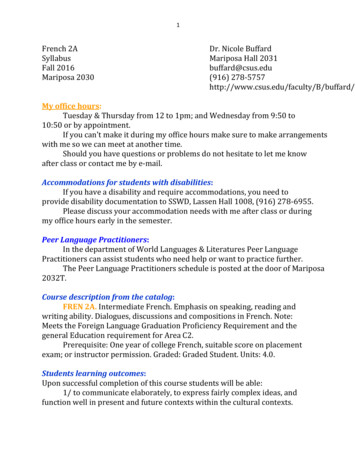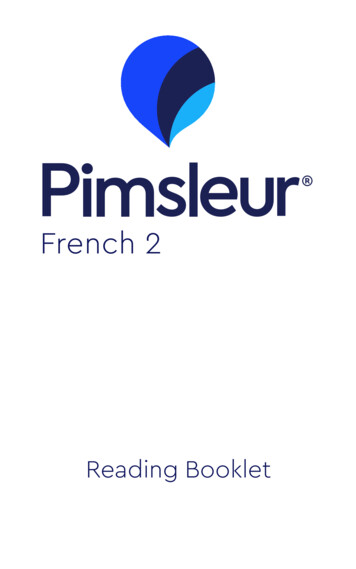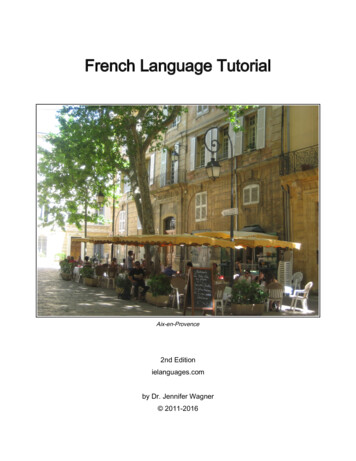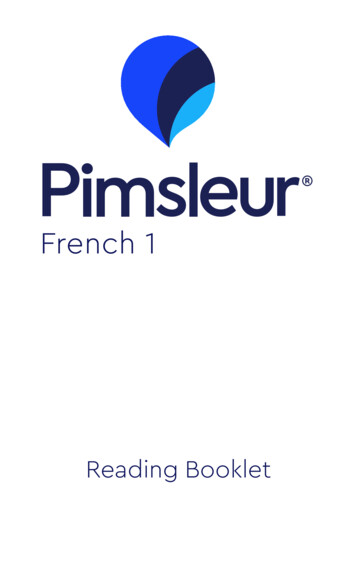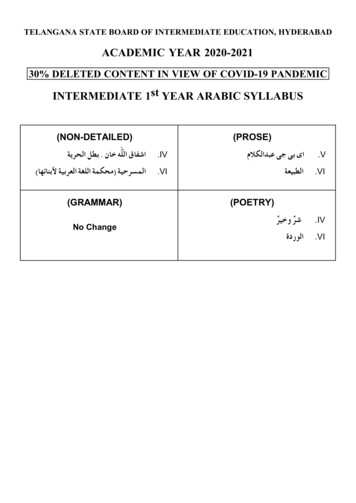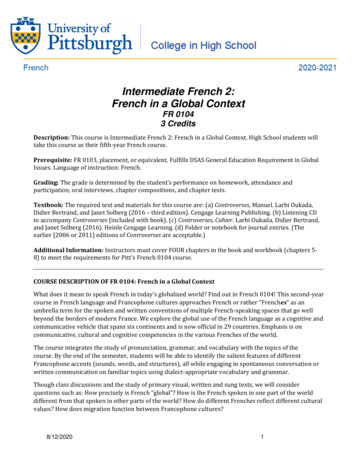
Transcription
Intermediate French 2:French in a Global ContextFR 01043 CreditsDescription: This course is Intermediate French 2: French in a Global Context. High School students willtake this course as their fifth-year French course.Prerequisite: FR 0103, placement, or equivalent. Fulfills DSAS General Education Requirement in GlobalIssues. Language of instruction: French.Grading: The grade is determined by the student’s performance on homework, attendance andparticipation, oral interviews, chapter compositions, and chapter tests.Textbook: The required text and materials for this course are: (a) Controverses, Manuel. Larbi Oukada,Didier Bertrand, and Janet Solberg (2016 – third edition). Cengage Learning Publishing. (b) Listening CDto accompany Controverses (included with book). (c) Controverses, Cahier. Larbi Oukada, Didier Bertrand,and Janet Solberg (2016). Heinle Cengage Learning. (d) Folder or notebook for journal entries. (Theearlier [2006 or 2011] editions of Controverses are acceptable.)Additional Information: Instructors must cover FOUR chapters in the book and workbook (chapters 58) to meet the requirements for Pitt’s French 0104 course.COURSE DESCRIPTION OF FR 0104: French in a Global ContextWhat does it mean to speak French in today's globalized world? Find out in French 0104! This second-yearcourse in French language and Francophone cultures approaches French or rather "Frenches" as anumbrella term for the spoken and written conventions of multiple French-speaking spaces that go wellbeyond the borders of modern France. We explore the global use of the French language as a cognitive andcommunicative vehicle that spans six continents and is now official in 29 countries. Emphasis is oncommunicative, cultural and cognitive competencies in the various Frenches of the world.The course integrates the study of pronunciation, grammar, and vocabulary with the topics of thecourse. By the end of the semester, students will be able to identify the salient features of differentFrancophone accents (sounds, words, and structures), all while engaging in spontaneous conversation orwritten communication on familiar topics using dialect-appropriate vocabulary and grammar.Though class discussions and the study of primary visual, written and sung texts, we will considerquestions such as: How precisely is French “global”? How is the French spoken in one part of the worlddifferent from that spoken in other parts of the world? How do different Frenches reflect different culturalvalues? How does migration function between Francophone cultures?8/12/20201
Language and Discourse Practice Objectives for French 0104: French in a Global ContextBy the end of this course, students will be able to: Speak French well enough to ask and answer questions on a variety of topics important infrancophone cultures beyond those needed to “survive” in the foreign culture. Indeed, you will gain theability to talk about more than yourself and your friends; you will be able to talk about globalization,gender and social issues, the ongoing residue of French and Belgian colonialism, and the worldwideFrench-language media. Gradually, you will find it easier to add detail to your narratives and to link ideastogether into more complex sentences. You should see an increased ability to discuss past or future eventswith less hesitation and greater accuracy. Understand French well enough to grasp main ideas and some supporting details in shortconversations (spontaneous or recorded) pertinent to topics mentioned above. Read and understand main ideas and many details text genres from a variety of internationalsources whose vehicle for expression is French, including, but not limited to literary texts from Africa, theAmericas, Asia and Europe. Write longer and more cohesive paragraphs than you wrote as a beginner to express argumentsand points of view on the topics above. Gain a greater awareness of the many francophone cultures, a better understanding of the culturalimplications of written, visual and virtual texts and how the world's "second second language" functions asa gateway for thought and reflection on global issues, linguistic and economic imperialism, colonialheritage and sustainability for people around the globe, whether they live in polities where French isofficial or not. Master the basic grammatical structures and have a better understanding of how French works as alanguage.Language-Learning Goals: Our goal in the French and Italian language programs is to guide you in thedevelopment of literacy skills in French through the communicative acts of reading, writing, andcreating discourse around texts of all types. Because you might have limited opportunities to speak orhear French outside of class, classroom time is devoted to developing your competence in these areas. Thismeans that your instructor will speak only French to you during class, and you will be expected to dothe same with your instructor and classmates. Should you need additional explanations or wish todiscuss matters not directly related to course content, your instructor will be happy to speak to you inEnglish before or after class and during office hours.Our approach to teaching and learning: The approach used in our courses can be characterized ascommunicative and integrated. “Communicative” means that the focus of the course is on language use inrealistic settings, not on performing exercises, which have no immediate justification other than thepractice of a particular procedure. “Integrated” means that the various aspects that make up the languagelearning experience are not separated or isolated but will be treated as complementary to one another. Inone single activity, you may learn some facts, practice certain grammatical structures, and communicativestrategies. Our approach is also “integrated” in the sense that language and culture are not treated asseparate but inter-related: You are learning about French culture not only when you listen to a song oranalyze a cultural document but also when you and your instructor use the language itself which is a socialand cultural tool.8/12/20202
Your role: Much of the responsibility for learning a language falls on you, the student. A large part of yourgrade is based on attendance and participation. Because it is not realistic to expect to communicate in anew language if you are not physically present to practice it, it is essential that you attend class regularly. Afew other suggestions that will ensure optimal benefits from your French class: Observe: Try to develop comprehension strategies to deal with the language-learning environmentand to understand what is expected of you in class. Study the gestures people make when they talk; watchothers who may know more than you do and use them as models. Ask for clarifications or explanations—inFrench! Listen: Realize that you need to understand the general meaning of messages, but you should resistthe urge to identify each word separately or translate things into English. Try to associate meaning directlyto what you see and hear so you may develop an understanding of French “from the inside.” Speak: Even if you feel you will make mistakes, speak as much as you can. We consider makingmistakes a necessary part of the learning process! Do pay attention to correct usage, and you will learnfrom your errors. Always remember that the superior language learner is a risk-taker.Resources in French. Your instructor will introduce you to a variety of multimedia materials. You will beusing the Web to access information about French-speaking countries in audio, video, and written formats.Materials: (Special Custom Second Edition)Oukada, Larbi, Didier Bertrand and Janet Solberg. (2016). Controverses: Special Custom Third Edition.Cengage Learning. Other readings provided on Canvas.Course policies: Assignments: You are responsible for doing the exercises in the workbook on your own and forself-correcting them by using the answer key at the end of the book. You may also be given otherhomework assignments. All homework assignments (whether self-corrected or not) must be completedand handed in on time. Academic Integrity: Cheating/plagiarism will not be tolerated. Students suspected of violating theUniversity of Pittsburgh Policy on Academic Integrity, from the February 1974 Senate Committee on Tenureand Academic Freedom reported to the Senate Council, will be required to participate in the outlinedprocedural process as initiated by the instructor. A minimum sanction of a zero score for the quiz or exam willbe imposed. View the complete policy at epartment of French and Italian Policy on Plagiarism:Plagiarism is a serious ethical matter and an infraction of University Policy. Students should familiarizethemselves with both the University Policy on Academic Integrity (availableat rity) and the Department of French and ItalianPlagiarism Policy e/plagiarism.php). Examples ofplagiarism include, but are not limited to:8/12/20203
1.2.3.4.Use of human or online translators (i.e. Google Translate)Unauthorized editorial help (asking a friend in an upper level course for help)Unattributed use of an author's ideas (theft of intellectual property)Unattributed use of an author's words (lack of proper citation)Any student who plagiarizes will be immediately reported to the Dean for Academic Integrity. Sanctionsfor first-time violations typically result in an “F” or zero for the assignment. Second violations may result inan “F” for the course and expulsion from the university. Please do not hesitate to contact your instructor orthe French Language Program Coordinator, Brett Wells (wellsb@pitt.edu) should you have questions anentthis policy.Evaluation:ExaminationsOrals (2) 15%, Midterm 10%, Final 20%Writing AssignmentsFormal (10%), Journal (10%)In-Class Participation, workbook checks and other homeworkQuizzes45%20%20%15%Final Exam: The final exam is comprehensive.Grading scale:A 98.00B 88.00C 78.00D 68.00A 93.00B 83.00C 73.00D 63.00A- 90.00B- 80.00C- 70.00D- 60.00 Oral Exams: Two oral exams will take place during the semester with your instructor. Participation: Since participation is a large component of your final grade in this course your dailyefforts to arrive punctually, come to class prepared, and participate in all class activities are essential. Yourinstructor will keep track of your participation and will keep you informed of your progress. Tests: For each of the two oral examinations, the Midterm Examination, the Final Examination, andQuizzes, make-ups will be allowed in the case of documented medical conditions (a written excuse from adoctor). Writing Assignments: There are two types of writing assignments in this course. Throughout theterm, you will be given journal assignments as a more informal way of working on your written French.These assignments will also serve as a vehicle for in-class participation, so you are expected to completejournal assignments in a timely way. The formal writing assignment (composition) serves as a differentwriting format that involves more reflective written work. For each formal writing assignment, you willspend time in class organizing and developing your ideas with your teacher’s help.8/12/20204
Other Classroom Policies:The Department of French and Italian's Statement on Diversity: Inspired by the University'snondiscrimination policy, we, the members of the Department of French and Italian, embrace a notion ofintellectual community enriched and enhanced by diversity in all forms. We appreciate that identities arecomplex, intersectional, and dynamic, in the classroom, in course materials, and in French- and Italianspeaking communities beyond campus. Diversity provides the benefit of allowing multiple perspectivesinside and outside of the classroom. We expect that all members of our learning community commit to 1)creating an intellectual space where students are free to express their opinions in ways that are respectfulof others and their perspectives, 2) engaging in the process of questioning and revising their own identitiesand perspectives, and 3) understanding the ways in which our identities position us within the classroom.At the University of Pittsburgh, course credits can count in three ways: toward the requirements for amajor, toward elective requirements, and/or toward the total number of credits needed to graduate.For this course: Majors: This course counts toward departmental majors and minors. Electives: Individual Schools and Colleges of the University (such as Engineering, Arts & Sciences,Business, Computing & Information, and so on) have different policies about elective credits andmay count this course as an elective. Students interested in studying at the University ofPittsburgh should contact their School/College of interest to see if this course would be counted. Graduation: This course’s credits count toward the number of credits needed for graduation.Academic Integrity: All College in High School teachers, students, and their parents/guardians are requiredto review and be familiar with the University of Pittsburgh’s Academic Integrity Policy located online Grades: Grade criteria in the high school course may differ slightly from University of Pittsburgh standards.A CHS student could receive two course grades: one for high school and one for the University transcript. Inmost cases the grades are the same. These grading standards are explained at the beginning of each course.Transfer Credit: University of Pittsburgh grades earned in CHS courses appear on an official University ofPittsburgh transcript, and the course credits are likely to be eligible for transfer to other colleges anduniversities. Students are encouraged to contact potential colleges and universities in advance to ensure theirCHS credits would be accepted. If students decide to attend any University of Pittsburgh campuses, theUniversity of Pittsburgh grade earned in the course will count toward the student grade point average at theUniversity. At the University of Pittsburgh, the CHS course supersedes any equivalent AP credit.Drops and Withdrawals: Students should monitor progress in a course. CHS teacher can obtain a CourseDrop/Withdrawal Request form from the CHS office or Aspire. The form must be completed by the student,teacher and parent/guardian and returned to teacher by deadlines listed. Dropping and withdrawing fromthe CHS course has no effect on enrollment in the high school credits for the course.8/12/20205
8/12/2020 1 Intermediate French 2: French in a Global Context FR 0104 3 Credits Description: This course is Intermediate French 2: French in a Global Context. High School students
